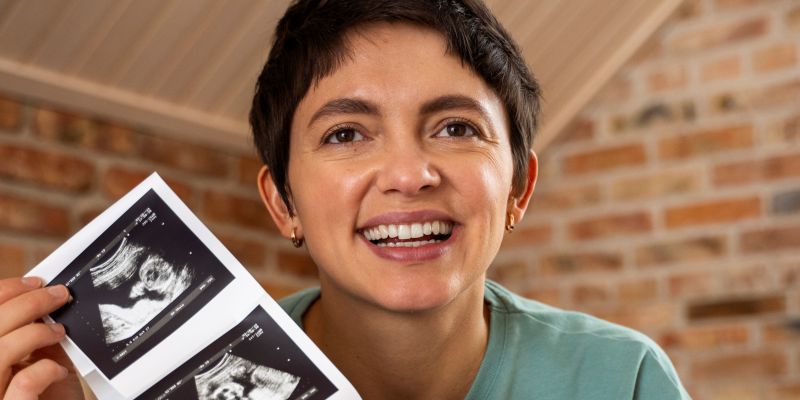
Home / Blogs / Starting a family/ Fertility / Pregnancy Calculator – Block The Date For The Greatest Arrival Of Your Life
Pregnancy Calculator - Block The Date For The Greatest Arrival Of Your Life

Author: Dr. Sushruta Mokadam (MBBS, MD)
 For any couple planning a family, the happiest moment is when the doctor says, “Congratulations, you are pregnant!” After this, a good amount of time is spent on discussions that involve estimating the due date. Of course, the doctor will share the date with the couple and unravel the mystery. Let’s look at the science behind the estimation of the date of delivery.
The human egg can fertilize for only 12 to 24 hours after ovulation, so the date of ovulation could be a reasonably good indicator to estimate the date of conception. Ultrasound which is used to determine the date of ovulation is not too perfect because this only suggests the gestational age. In fact an accurate date of conception is usually arrived at only with IVF (In Vitro Fertilization).
Also to be considered is that although a woman is most likely to conceive if she has had sex on the day of ovulation, pregnancy could occur from active sperm in her reproductive tract on the day of ovulation, even if the woman had intercourse five days prior to that date.
For any couple planning a family, the happiest moment is when the doctor says, “Congratulations, you are pregnant!” After this, a good amount of time is spent on discussions that involve estimating the due date. Of course, the doctor will share the date with the couple and unravel the mystery. Let’s look at the science behind the estimation of the date of delivery.
The human egg can fertilize for only 12 to 24 hours after ovulation, so the date of ovulation could be a reasonably good indicator to estimate the date of conception. Ultrasound which is used to determine the date of ovulation is not too perfect because this only suggests the gestational age. In fact an accurate date of conception is usually arrived at only with IVF (In Vitro Fertilization).
Also to be considered is that although a woman is most likely to conceive if she has had sex on the day of ovulation, pregnancy could occur from active sperm in her reproductive tract on the day of ovulation, even if the woman had intercourse five days prior to that date.
 Coming to ultrasound, this approach considers the size of the foetus to determine the gestational age (the time since the first day of LMP). The accuracy of such an estimate of the gestational age varies. Using ultrasound to measure the foetus in the first trimester (up to and including 13 6/7 weeks of gestation) is the most accurate method to arrive at the gestational age.
Canada’s Society of Obstetricians and Gynaecologists recommends the earliest ultrasound presenting a crown rump length that indicates at least 7 weeks (or 10 mm) should be used as the benchmark to arrive at the gestational age.
In the case of Vitro Fertilization (IVF), the date of conception will be known accurately and EDD can be calculated by adding 266 days to that date.
The American College of Obstetricians and Gynaecologists recommends that the dates arrived at through ultrasound should be considered over those indicated by LMP when the variation between ultrasound and LMP is:
Coming to ultrasound, this approach considers the size of the foetus to determine the gestational age (the time since the first day of LMP). The accuracy of such an estimate of the gestational age varies. Using ultrasound to measure the foetus in the first trimester (up to and including 13 6/7 weeks of gestation) is the most accurate method to arrive at the gestational age.
Canada’s Society of Obstetricians and Gynaecologists recommends the earliest ultrasound presenting a crown rump length that indicates at least 7 weeks (or 10 mm) should be used as the benchmark to arrive at the gestational age.
In the case of Vitro Fertilization (IVF), the date of conception will be known accurately and EDD can be calculated by adding 266 days to that date.
The American College of Obstetricians and Gynaecologists recommends that the dates arrived at through ultrasound should be considered over those indicated by LMP when the variation between ultrasound and LMP is:
Consultant - Obstetrician & Gynaecologist at Motherhood Hospitals, Kharadi
 For any couple planning a family, the happiest moment is when the doctor says, “Congratulations, you are pregnant!” After this, a good amount of time is spent on discussions that involve estimating the due date. Of course, the doctor will share the date with the couple and unravel the mystery. Let’s look at the science behind the estimation of the date of delivery.
The human egg can fertilize for only 12 to 24 hours after ovulation, so the date of ovulation could be a reasonably good indicator to estimate the date of conception. Ultrasound which is used to determine the date of ovulation is not too perfect because this only suggests the gestational age. In fact an accurate date of conception is usually arrived at only with IVF (In Vitro Fertilization).
Also to be considered is that although a woman is most likely to conceive if she has had sex on the day of ovulation, pregnancy could occur from active sperm in her reproductive tract on the day of ovulation, even if the woman had intercourse five days prior to that date.
For any couple planning a family, the happiest moment is when the doctor says, “Congratulations, you are pregnant!” After this, a good amount of time is spent on discussions that involve estimating the due date. Of course, the doctor will share the date with the couple and unravel the mystery. Let’s look at the science behind the estimation of the date of delivery.
The human egg can fertilize for only 12 to 24 hours after ovulation, so the date of ovulation could be a reasonably good indicator to estimate the date of conception. Ultrasound which is used to determine the date of ovulation is not too perfect because this only suggests the gestational age. In fact an accurate date of conception is usually arrived at only with IVF (In Vitro Fertilization).
Also to be considered is that although a woman is most likely to conceive if she has had sex on the day of ovulation, pregnancy could occur from active sperm in her reproductive tract on the day of ovulation, even if the woman had intercourse five days prior to that date.
Determining the Estimated Due Date
Estimated Due Date (EDD or EDC) is that date on which a non-induced delivery is expected to occur. This date is arrived at by taking the first day of the Last Menstrual Period (LMP) and adding 280 days (9 months and 7 days) to it. This is the method followed by ‘pregnancy wheels’, also called a Gestation Calculator. The accuracy of the estimation of EDD in this method depends on how accurately the mother can recall the day of intercourse, assuming she has regular 28 day cycles and that ovulation and conception occurs on the 14th day of the cycle. Assumption of LMP to arrive at the due date of pregnancy may result in an overestimation of the pregnancy duration to the tune of over 2 weeks. Coming to ultrasound, this approach considers the size of the foetus to determine the gestational age (the time since the first day of LMP). The accuracy of such an estimate of the gestational age varies. Using ultrasound to measure the foetus in the first trimester (up to and including 13 6/7 weeks of gestation) is the most accurate method to arrive at the gestational age.
Canada’s Society of Obstetricians and Gynaecologists recommends the earliest ultrasound presenting a crown rump length that indicates at least 7 weeks (or 10 mm) should be used as the benchmark to arrive at the gestational age.
In the case of Vitro Fertilization (IVF), the date of conception will be known accurately and EDD can be calculated by adding 266 days to that date.
The American College of Obstetricians and Gynaecologists recommends that the dates arrived at through ultrasound should be considered over those indicated by LMP when the variation between ultrasound and LMP is:
Coming to ultrasound, this approach considers the size of the foetus to determine the gestational age (the time since the first day of LMP). The accuracy of such an estimate of the gestational age varies. Using ultrasound to measure the foetus in the first trimester (up to and including 13 6/7 weeks of gestation) is the most accurate method to arrive at the gestational age.
Canada’s Society of Obstetricians and Gynaecologists recommends the earliest ultrasound presenting a crown rump length that indicates at least 7 weeks (or 10 mm) should be used as the benchmark to arrive at the gestational age.
In the case of Vitro Fertilization (IVF), the date of conception will be known accurately and EDD can be calculated by adding 266 days to that date.
The American College of Obstetricians and Gynaecologists recommends that the dates arrived at through ultrasound should be considered over those indicated by LMP when the variation between ultrasound and LMP is:
- More than 5 days before 9 0/7 weeks as indicated by LMP
- More than 7 days from 9 0/7 weeks to 15 6/7 weeks as indicated by LMP
- More than 10 days from 16 0/7 weeks to 21 6/7 weeks as indicated by LMP
- More than 14 days from 22 0/7 weeks to 27 6/7 weeks as indicated by LMP
- More than 21 days after 28 0/7 weeks as indicated by LMP
Clinical Examination
For a patient with a good menstrual record in the first trimester, a simple pelvic examination has proven to be a reliable method to accurately date the pregnancy. Doppler Ultrasonography A foetal heart beat can be heard with a Doppler ultrasound if the gestational age of the patient is 10 to 12 weeks in most cases. This is the minimum age for the foetal heart tone to be registered. Human Chorionic Gonadotropin Pregnancy Test Human Chorionic Gonadotropin is detectable in the mother's blood or urine from 6 to 14 days after fertilization (3 to 4 weeks of gestational age). The gestational age can be assessed as at least 3 to 4 weeks at the time of an hCG pregnancy test. In case of a twin pregnancy In case of a twin pregnancy due to an IVF procedure, the gestational age has to be considered from the date of embryo transfer. Considering the possibility of an early intrauterine growth restriction in one of the foetuses, specialists feel that it is advisable to consider assessing the gestational age using the larger foetus. For those of you curious to access a pregnancy calculator, here’s one right here! We at Motherhood Hospitals have a team of experts specialising in all kinds of maternity and childbirth related issues and woman and child care - from teens to those in their post menopause years. Take an appointment with our specialist at a centre close to you and you will be assured of an accurate investigation, diagnosis and treatment. Book your appointment with Dr. Sushruta Mokadam for all Gynaecological issues.Related Blogs

Understanding Gestational Diabetes: Insights from Dr Shruthi Kalagara
Read More
Urinary Tract Infection (UTI) in Pregnancy
Read More
Early Pregnancy Care for New Pregnant Women: Expert Advice | Motherhood Hospitals
Read More
Body Positivity Tips Post C Section (Cesarean Delivery)
Read More
Vaginoplasty: Procedure, Cost, Risks & Benefits, Recovery
Read More
The Digital Dilemma: Exploring the Medical Implications of Technology on Child Development
Read More
How To Relieve Menstrual Cramps? - 8 Simple Tips
Read More
Benefits of Consuming Folic Acid Tablets For Pregnancy/During Pregnancy
Read More
Navigating Radiology: Ensuring Safe Imaging During Pregnancy
Read More
Navigating Radiological Tests During Pregnancy: Ensuring Safety for Mother and Child
Read MoreRequest A Call Back
Leave a Comment:
View Comments
Previous
Next
HELLO,
Stay update don our latest packages, offer, news, new launches, and more. Enter your email to subscribe to our news letter


 Toll Free Number
Toll Free Number








No comment yet, add your voice below!